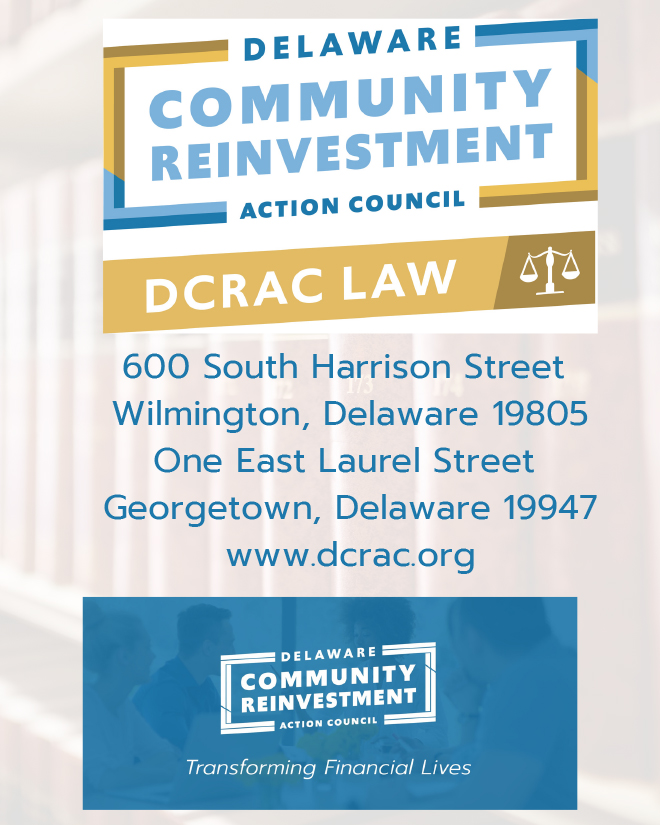Advance Health Care Directive. The Keyword Is Advance!

By Jaclyn Quinn, Esq.
Delaware Community Reinvestment Action Council, Inc.
Planning before a crisis occurs is the only way to be prepared. One of the most challenging aspects of being an Estate Planning attorney is when I need to meet families in the middle of a medical crisis and I see the confusion, fear, and stress of the moment overwhelm them. It is much easier to plan during a calm time, without the added burden of imminent medical procedures and uncertainty.
Many clients tell me that their doctors “are always asking” if they have a health care directive and they are urged to complete one, but they don’t feel the need to do it when they’re healthy. The reality is, that our circumstances can change in an instant, and if your directive is not in place, your loved ones will have limited tools available to advocate and make decisions on your behalf.
In Delaware, we have a form called the Advance Health Care Directive. In this one form, many important authorizations are accomplished. First, the form allows you to appoint agents who will act on your behalf if you no longer have the capacity to communicate with your doctors to accomplish your medical care. Administrative tasks such as scheduling appointments, completing new patient paperwork, consenting to treatment, and admission/discharge from facilities are all things your agent could do if you are unable. Also, the form allows for sharing medical information in accordance with applicable patient privacy laws while your agent is acting on your behalf.

The next part of the directive contains the information sometimes referred to as the living will. Here, you inform your agents and doctors about what your end of life wishes are. In the Delaware specific form, the three medical scenarios are Terminally Ill, Permanantly Unconscious, and Serious Illness and Frailty. In each of these instances, you can say whether you’d want your agents to make decisions if you’re unable to make or communicate your wishes, or you can indicate that you’d want to prolong your life, or not prolong your life. There are also details about specific treatments you’d wish to include or exclude, and whether or not you’d wish to be treated with pain relief medication.
Lastly, you can elaborate on any anatomical gift preferences. If you want to be an organ donor for certain purposes, or if you wish to donate your body or organs to a particular facility for research, you can provide this information on your form so that your agents are aware and there will be no uncertainty about what you’d like them to do when that time comes.
Completing an Advance Health Care Directive isn’t exactly a fun task, but doing it when you have time and the ability to peacefully consider your options makes it far less stressful. Quite often, clients tell me how relieved they are once we have this document complete. You can make changes to the directive if your decisions change as time goes on. Once it is in effect, it will remain valid unless you decide to revoke it.
If you need legal advice, Jaclyn Quinn is licensed to practice law in Delaware and she and her colleagues at the Delaware Community Reinvestment Action Council are available to assist. For more information, please visit www.dcrac.org. To schedule a consultation, call (302) 298-3251 or email [email protected].
Bio
Jaclyn Quinn, Esq. joined the Delaware Community Reinvestment Action Council (DCRAC) in 2011, first as a volunteer, then as staff. In 2014 Jaclyn opened and grew her private practice until 2019, when DCRAC Law opened to the community. DCRAC Law is a nonprofit law firm providing tax, title, and other legal services to those unable to pay market rates.
Jaclyn graduated with a B.A. in Political Science from The College of New Jersey before moving to Delaware to pursue her J.D. at Widener University- Delaware Law School. She was admitted to the Delaware Bar in 2012, and is also barred in U.S. Tax Court and U.S. Immigration Court. She has volunteered with the Office of the Child Advocate, DVLS, and assists as pro bono counsel in a variety of cases.
Jaclyn Quinn, Esq. Delaware Community Reinvestment Action Council (DCRAC)
302-298-3251 [email protected] www.dcrac.org
@dcracdelcra on instagram & @DCRACDelCRA on facebook
600 South Harrison Street, Wilmington, Delaware
One East Laurel Street, Georgetown, Delaware


